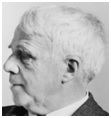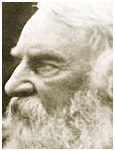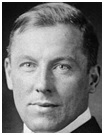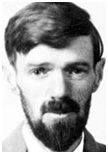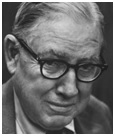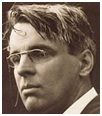|
 |
|
 |
Poetry - Work and Workers
Robert Frost (1874-1963), After Apple-Picking (1914) The American poet (pictured right) describes an apple picker who is tired from the:
Of apple-picking: I am overtired Of the great harvest I myself desired. (lines 28 and 29)
Alexander McClachlan (1818-96), The Workman’s Song The Scottish Canadian poet describes workers’ exploitation:
Come all ye weary sons of toil, And listen to my song. We’ve eat oppression’s bitter bread, And eat it far too long. (first verse)
Henry Wadsworth Longfellow (1807-82) , The Village Blacksmith
(1842) The American poet (pictured right) describes how the blacksmith’s honest toil gives him self-respect:
His brow is wet with honest sweat, He earns whate'er he can, And looks the whole world in the face, For he owes not any man. (second verse, last four lines)
Robert Service (1874-1958), Work (1955) The Canadian poet (pictured right) describes the joy of his work as a writer, saying he would like to die with “a pencil in my hand” (last line):
And yet I do not sadly grieve Such squandering of golden days; For from my dreaming I believe Have stemmed my least unworthy lays. Aye, toil is best when all is said, As age has made me understand ... So fitly fold, when I am dead, A pencil in my hand. (last verse)
Robert Service (1874-1958), Self-Made Man (1951) In this poem Service writes of an employer who regrets his unsympatheic refusal to give his poor striking workers a pay rise (pelf in the third line below is money):
I've risen from the ranks myself; By brawn and brain I've made my way. Had I bet, beered and blown my pelf, I would have been as poor as they. Had I wed young to thrift's unheed, I might have been a toiler now, With rent to pay and kids to feed, And bloody sweat upon my brow.
Ah there's the point! “I might have been”. I might have been as peeved as they, And know what misery can mean, And ask like them a raise of pay. (verse 3 and first four lines of verse 4)
Langston Hughes (1902-67), Let America
Be America Again (1935) The American poet (pictured right) attacks the philosophy of “dog eat dog, of majority crush the weak” and then proclaims:
O, let America be America again - The land that never has been yet- And yet must be--the land where every man is free. The land that's mine - the poor man's, Indian's, Negro's, ME - Who made America, Whose sweat and blood, whose faith and pain, Whose hand at the foundry, whose plow [plough] in the rain, Must bring back our mighty dream again. (Verse 10)
She Was Poor But She Was Honest (poet unknown) An unknown poet emphasizes the exploitation of the poor by the rich:
It's the same the whole world over; It's the poor that gets the blame, It's the rich that get the pleasure. Isn't it a blooming shame? (last verse)
D.H. Lawrence (1885-1930), The Triumph of the
Machine (1932) The English poet and author of Sons and Lovers (pictured right) says machines can't provide spiritual fulfilment:
Machines don't help people's souls: And against this inward revolt of the native creatures of the soul mechanical man, in triumph seated upon the seat of his machine will be powerless, for no engine can reach into the marshes and depths of a man. (lines 25-7)
Ogden Nash (1902-71), The Banker's Special
(1949) The American poet (pictured right) takes a comical swipe at commuting:
Commuters think nothing could be more beautiful Than the happy hours of the life commutiful, But as one who tried it and now repentest, I'd rather go twice a day to the dentist. (Lines 5-8)
W.B. Yeats, The Choice (1933) The Irish poet (pictured right) says that work can damage your life:
The intellect of man is forced to choose Perfection of the life, or of the work, And if it take the second must refuse A heavenly mansion, raging in the dark. (first four lines)
|
|
|
||
|
|
|
||
|
||
| Copyright © wisdomtowin.com All Rights Reserved | ||
|

